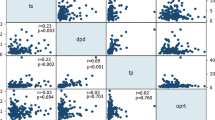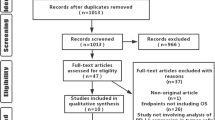Abstract
Colorectal cancer (CRC) is the third most common cancer worldwide. Predictive biomarkers are needed to predict patients’ outcomes and to select a chemotherapy regimen. We assessed whether dihydropyrimidine dehydrogenase (DPD)-related indicators can predict CRC patients’ outcomes. We searched the studies in PubMed, EmBase, and the Cochrane Library up to March 4, 2018. We mainly analyzed different CRC patients’ outcomes according to specific DPD-related indicators. Twenty-five articles were included in the meta-analysis. The results showed that for disease-free survival (DFS), low DPD expression was significantly superior to high expression (I2 = 72%; HR: 1.59; 95%CI: 1.21–2.09; p = 0.001). However, this result had a potential publication bias (Begg’s test: p = 0.007; Egger’s test: p = 0.004). Among patients treated with chemotherapy, a high thymidylate phosphorylase (TP)/DPD ratio was advantageous for DFS (I2 = 63.7%; HR: 0.65; 95%CI: 0.46–0.92; p = 0.015), and this result did not have a publication bias. For overall survival (OS), low DPD expression was superior to high expression (I2 = 74.4%; HR: 2.11; 95%CI: 1.48–3.00; p < 0.001), although this result had a publication bias (Egger’s test: p = 0.003; Begg’s test: p = 0.010). There was no difference in OS according to the TP/DPD ratio (I2 = 0%; HR: 0.92; 95%CI: 0.75–1.13; p = 0.420). DFS and OS were better in CRC patients with low DPD expression than in those with high DPD expression. However, because of publication bias, more DPD indicator-related studies, especially with negative results, are still needed. Patients with a high TP/DPD ratio have better DFS but not OS.






Similar content being viewed by others
References
Grothey A, Sobrero AF, Shields AF, Yoshino T, Paul J, Taieb J, Souglakos J, Shi Q, Kerr R, Labianca R, Meyerhardt JA, Vernerey D, Yamanaka T, Boukovinas I, Meyers JP, Renfro LA, Niedzwiecki D, Watanabe T, Torri V, Saunders M, Sargent DJ, Andre T, Iveson T (2018) Duration of adjuvant chemotherapy for stage III colon cancer. N Engl J Med 378(13):1177–1188
Wu DM, Wang YJ, Fan SH, Zhuang J, Zhang ZF, Shan Q, Han XR, Wen X, Li MQ, Hu B, Sun CH, Bao YX, Xiao HJ, Yang L, Lu J, Zheng YL (2017) Network meta-analysis of the efficacy of first-line chemotherapy regimens in patients with advanced colorectal cancer. Oncotarget 8(59):100668–100677
Iveson TJ, Kerr RS, Saunders MP, Cassidy J, Hollander NH, Tabernero J, Haydon A, Glimelius B, Harkin A, Allan K, McQueen J, Scudder C, Boyd KA, Briggs A, Waterston A, Medley L, Wilson C, Ellis R, Essapen S, Dhadda AS, Harrison M, Falk S, Raouf S, Rees C, Olesen RK, Propper D, Bridgewater J, Azzabi A, Farrugia D, Webb A, Cunningham D, Hickish T, Weaver A, Gollins S, Wasan HS, Paul J (2018) 3 versus 6 months of adjuvant oxaliplatin-fluoropyrimidine combination therapy for colorectal cancer (SCOT): an international, randomised, phase 3, non-inferiority trial. Lancet Oncol 19(4):562–578
Ofverholm A, Arkblad E, Skrtic S, Albertsson P, Shubbar E, Enerback C (2010) Two cases of 5-fluorouracil toxicity linked with gene variants in the DPYD gene. Clin Biochem 43(3):331–334
Cubero DI, Del Giglio A (2013) Tegafur-uracil (UFT) in lower doses is safe for the treatment of colorectal cancer in patients with partial dihydropyrimidine dehydrogenase deficiency: a proof of principle. Ther Adv Med Oncol 5(1):93–94
van Kuilenburg AB, Hausler P, Schalhorn A, Tanck MW, Proost JH, Terborg C et al (2012) Evaluation of 5-fluorouracil pharmacokinetics in cancer patients with a c.1905+1G>A mutation in DPYD by means of a Bayesian limited sampling strategy. Clin Pharmacokinet 51(3):163–174
Higgins JP, Altman DG, Gotzsche PC, Juni P, Moher D, Oxman AD et al (2011) The Cochrane Collaboration's tool for assessing risk of bias in randomised trials. BMJ 343:d5928
Stang A (2010) Critical evaluation of the Newcastle-Ottawa scale for the assessment of the quality of nonrandomized studies in meta-analyses. Eur J Epidemiol 25(9):603–605
Ades AE, Lu G, Higgins JP (2005) The interpretation of random-effects meta-analysis in decision models. Med Decis Mak 25(6):646–654
Duval S, Tweedie R (2000) Trim and fill: a simple funnel-plot-based method of testing and adjusting for publication bias in meta-analysis. Biometrics 56(2):455–463
Koda K, Miyauchi H, Kosugi C, Kaiho T, Takiguchi N, Kobayashi S, Maruyama T, Matsubara H, (Boso Clinical Oncology Group) (2016) Tumor 5-FU-related mRNA expression and efficacy of Oral Fluoropyrimidines in adjuvant chemotherapy of colorectal Cancer. Anticancer Res 36(10):5325–5331
Schmoll HJ, Tabernero J, Maroun J, de Braud F, Price T, Van Cutsem E et al (2015) Capecitabine plus oxaliplatin compared with fluorouracil/Folinic acid as adjuvant therapy for stage III colon cancer: final results of the NO16968 randomized controlled phase III trial. J Clin Oncol 33(32):3733–3740
Mori T, Ohue M, Takii Y, Hashizume T, Kato T, Kotake K et al (2013) Factors predicting the response to oral fluoropyrimidine drugs: a phase II trial on the individualization of postoperative adjuvant chemotherapy using oral fluorinated pyrimidines in stage III colorectal cancer treated by curative resection (ACT-01 study). Oncol Rep 29(2):437–444
Soong R, Shah N, Salto-Tellez M, Tai BC, Soo RA, Han HC et al (2008) Prognostic significance of thymidylate synthase, dihydropyrimidine dehydrogenase and thymidine phosphorylase protein expression in colorectal cancer patients treated with or without 5-fluorouracil-based chemotherapy. Ann Oncol 19(5):915–919
Lassmann S, Hennig M, Rosenberg R, Nahrig J, Schreglmann J, Krause F et al (2006) Thymidine phosphorylase, dihydropyrimidine dehydrogenase and thymidylate synthase mRNA expression in primary colorectal tumors-correlation to tumor histopathology and clinical follow-up. Int J Color Dis 21(3):238–247
Tsuji T, Sawai T, Takeshita H, Nakagoe T, Hidaka S, Atsushi N et al (2004) Tumor dihydropyrimidine dehydrogenase in stage II and III colorectal cancer: low level expression is a beneficial marker in oral-adjuvant chemotherapy, but is also a predictor for poor prognosis in patients treated with curative surgery alone. Cancer Lett 204(1):97–104
Kataoka K, Kanazawa A, Nakajima A, Yamaguchi A, Arimoto A (2015) Prognostic value of biomarkers in metastatic colorectal cancer patients. J Surg Res 194(2):343–350
Shigeta K, Ishii Y, Hasegawa H, Okabayashi K, Kitagawa Y (2014) Evaluation of 5-fluorouracil metabolic enzymes as predictors of response to adjuvant chemotherapy outcomes in patients with stage II/III colorectal cancer: a decision-curve analysis. World J Surg 38(12):3248–3256
Koumarianou A, Tzeveleki I, Mekras D, Eleftheraki AG, Bobos M, Wirtz R, Fountzilas E, Valavanis C, Xanthakis I, Kalogeras KT, Basdanis G, Pentheroudakis G, Kotoula V, Fountzilas G (2014) Prognostic markers in early-stage colorectal cancer: significance of TYMS mRNA expression. Anticancer Res 34(9):4949–4962
Ochiai T, Umeki M, Miyake H, Iida T, Okumura M, Ohno K et al (2014) Impact of 5-fluorouracil metabolizing enzymes on chemotherapy in patients with resectable colorectal cancer. Oncol Rep 32(3):887–892
Donada M, Bonin S, Nardon E, De Pellegrin A, Decorti G, Stanta G (2011) Thymidilate synthase expression predicts longer survival in patients with stage II colon cancer treated with 5-flurouracil independently of microsatellite instability. J Cancer Res Clin Oncol 137(2):201–210
Jensen SA, Vainer B, Kruhoffer M, Sorensen JB (2009) Microsatellite instability in colorectal cancer and association with thymidylate synthase and dihydropyrimidine dehydrogenase expression. BMC Cancer 9:25
Gustavsson B, Kaiser C, Carlsson G, Wettergren Y, Odin E, Lindskog EB, Niyikiza C, Ma D (2009) Molecular determinants of efficacy for 5-FU-based treatments in advanced colorectal cancer: mRNA expression for 18 chemotherapy-related genes. Int J Cancer 124(5):1220–1226
Yamada H, Iinuma H, Watanabe T (2008) Prognostic value of 5-fluorouracil metabolic enzyme genes in Dukes' stage B and C colorectal cancer patients treated with oral 5-fluorouracil-based adjuvant chemotherapy. Oncol Rep 19(3):729–735
Tokunaga Y, Sasaki H, Saito T (2007) Clinical role of orotate phosphoribosyl transferase and dihydropyrimidine dehydrogenase in colorectal cancer treated with postoperative fluoropyrimidine. Surgery 141(3):346–353
Ochiai T, Nishimura K, Noguchi H, Kitajima M, Tsukada A, Watanabe E, Nagaoka I, Futagawa S (2006) Prognostic impact of orotate phosphoribosyl transferase among 5-fluorouracil metabolic enzymes in resectable colorectal cancers treated by oral 5-fluorouracil-based adjuvant chemotherapy. Int J Cancer 118(12):3084–3088
Hotta T, Takifuji K, Taniguchi K, Sahara M, Yokoyama S, Matsuda K, Higashiguchi T, Tominaga T, Oku Y, Yamaue H (2006) The relationship between survival and the expression of dihydropyrimidine dehydrogenase in patients with colorectal cancer. Oncol Rep 16(1):177–182
Ciaparrone M, Quirino M, Schinzari G, Zannoni G, Corsi DC, Vecchio FM, Cassano A, la Torre G, Barone C (2006) Predictive role of thymidylate synthase, dihydropyrimidine dehydrogenase and thymidine phosphorylase expression in colorectal cancer patients receiving adjuvant 5-fluorouracil. Oncology 70(5):366–377
Westra JL, Hollema H, Schaapveld M, Platteel I, Oien KA, Keith WN, Mauritz R, Peters GJ, Buys CHCM, Hofstra RMW, Plukker JTM (2005) Predictive value of thymidylate synthase and dihydropyrimidine dehydrogenase protein expression on survival in adjuvantly treated stage III colon cancer patients. Ann Oncol 16(10):1646–1653
Tsuji T, Sawai T, Takeshita H, Nakagoe T, Hidaka S, Yamaguchi H, Yasutake T, Nagayasu T, Tagawa Y (2004) Tumor dihydropyrimidine dehydrogenase expression is a useful marker in adjuvant therapy with oral fluoropyrimidines after curative resection of colorectal cancer. Cancer Chemother Pharmacol 54(6):531–536
Oi K, Makino M, Ozaki M, Takemoto H, Yamane N, Nakamura S, Ikeguchi M, Kaibara N (2004) Immunohistochemical dihydropyrimidine dehydrogenase expression is a good prognostic indicator for patients with Dukes' C colorectal cancer. Anticancer Res 24(1):273–279
Kornmann M, Schwabe W, Sander S, Kron M, Strater J, Polat S et al (2003) Thymidylate synthase and dihydropyrimidine dehydrogenase mRNA expression levels: predictors for survival in colorectal cancer patients receiving adjuvant 5-fluorouracil. Clin Cancer Res 9(11):4116–4124
Ichikawa W, Uetake H, Shirota Y, Yamada H, Takahashi T, Nihei Z et al (2003) Both gene expression for orotate phosphoribosyltransferase and its ratio to dihydropyrimidine dehydrogenase influence outcome following fluoropyrimidine-based chemotherapy for metastatic colorectal cancer. Br J Cancer 89(8):1486–1492
Ichikawa W, Uetake H, Shirota Y, Yamada H, Nishi N, Nihei Z, Sugihara K, Hirayama R (2003) Combination of dihydropyrimidine dehydrogenase and thymidylate synthase gene expressions in primary tumors as predictive parameters for the efficacy of fluoropyrimidine-based chemotherapy for metastatic colorectal cancer. Clin Cancer Res 9(2):786–791
Ikeguchi M, Makino M, Kaibara N (2002) Thymidine phosphorylase and dihydropyrimidine dehydrogenase activity in colorectal carcinoma and patients prognosis. Langenbeck's Arch Surg 387(5–6):240–245
Yoshisue K, Kanie S, Nishimura T, Chikamoto J, Nagayama S (2009) Effect of dimethylnitrosamine-induced liver dysfunction on the pharmacokinetics of 5-fluorouracil after administration of S-1, an antitumour drug, to rats. J Pharm Pharmacol 61(12):1643–1651
Bronckaers A, Gago F, Balzarini J, Liekens S (2009) The dual role of thymidine phosphorylase in cancer development and chemotherapy. Med Res Rev 29(6):903–953
Elamin YY, Rafee S, Osman N, O Byrne KJ, Gately K (2016) Thymidine phosphorylase in cancer; enemy or friend? Cancer Microenviron 9(1):33–43
Ranieri G, Grammatica L, Patruno R, Zito AF, Valerio P, Iacobellis S et al (2007) A possible role of thymidine phosphorylase expression and 5-fluorouracil increased sensitivity in oropharyngeal cancer patients. J Cell Mol Med 11(2):362–368
Amatori F, Di Paolo A, Del Tacca M, Fontanini G, Vannozzi F, Boldrini L et al (2006) Thymidylate synthase, dihydropyrimidine dehydrogenase and thymidine phosphorylase expression in colorectal cancer and normal mucosa in patients. Pharmacogenet Genomics 16(11):809–816
Author information
Authors and Affiliations
Corresponding author
Ethics declarations
Conflicts of Interest
The authors declare that there is no conflict of interests in this work.
Additional information
Publisher’s Note
Springer Nature remains neutral with regard to jurisdictional claims in published maps and institutional affiliations.
Electronic Supplementary Material
ESM 1
(DOCX 15 kb)
Supplementary Figure 1
Risk of bias graph for each included comparison study. (PNG 256 kb)
Rights and permissions
About this article
Cite this article
Sun, X., Guo, S. The Prognostic and Predictive Value of Dihydropyrimidine Dehydrogenase-Related Indicators in Clinical Outcomes of Chemotherapy in Colorectal Cancer Patients: a Systematic Review and Meta-Analysis. Pathol. Oncol. Res. 26, 121–131 (2020). https://doi.org/10.1007/s12253-018-00563-3
Received:
Accepted:
Published:
Issue Date:
DOI: https://doi.org/10.1007/s12253-018-00563-3




